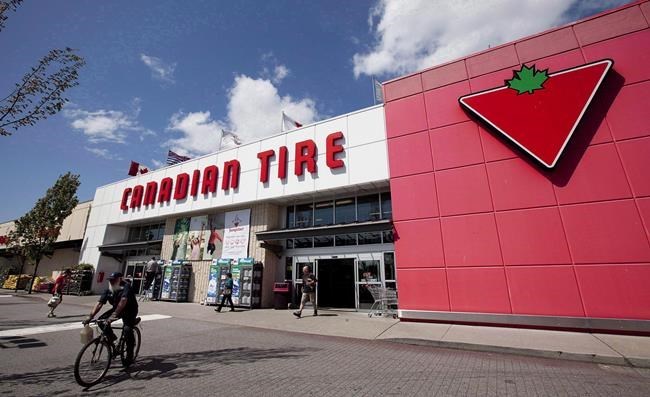TORONTO — Demand for non-essential items at Canadian Tire stores took a dive last quarter as the company said customers are increasingly feeling the pinch of higher inflation and interest rates.
Those struggles prompted Canadian Tire Corp. Ltd. to withdraw its sales growth target on Thursday amid a drop in earnings and revenue.
The current economic environment and level of consumer demand "differ significantly from our expectations when we set out our strategy in early 2022," said Canadian Tire president and CEO Greg Hicks.
"Our second quarter results marked a turning point in the Canadian economy," Hicks told analysts on a call.
"With 10 interest rate hikes in less than 18 months and persistent inflation impacting the cost of living and leading to reduced savings cushions, Canadian consumers are experiencing increased financial strain and facing tougher spending decisions."
He noted a "performance bifurcation" between purchases of essential and discretionary products at Canadian Tire stores. Sales of essential goods were up more than six per cent in the second quarter, while the company's discretionary goods portfolio was down more than three per cent.
Household items considered essential such as light bulbs, paper towels, brooms and other cleaning products are likely still in high demand at Canadian Tire stores, along with basic automotive products like motor oil, said retail analyst Bruce Winder.
But he said there's probably been a pullback for nice-to-have things such as camping and gardening equipment, or sporting goods.
"Their business model is such that, in times of recession, discretionary items are under pressure," said Winder.
"Inflation … is still running around nine per cent for food, so that's sucking a lot of the dollars out of each household. They don't have any money to spend on discretionary goods."
In the three months ended July 1, the Toronto-based retail giant said net income attributable to shareholders fell 32 per cent to $99.4 million from $145.2 million in the same period a year earlier. The 101-year-old company said revenue in its second quarter fell three per cent to $4.26 billion from $4.40 billion the previous year.
"The discretionary softness is coming from more indebted households, most notably in Ontario and B.C.," said Hicks, adding those two provinces have the highest concentration of debt-to-disposable income in Canada.
"Changes in monetary policy are softening consumer spend across the country, with the last two interest rate moves specifically creating a more pronounced demand impact in discretionary categories."
The Bank of Canada hiked its key interest rate by another quarter of a percentage point last month, bringing it to five per cent — the highest it's been since 2001.
The central bank's decision came as it released projections suggesting inflation won't come down to its two per cent target until mid-2025, throwing cold water on the idea that rate cuts are imminent.
Given the economic climate, Canadian Tire's target of four per cent average annual sales growth by 2025 is no longer appropriate, the company said.
That forecast also included diluted earnings per share of at least $26 and retail return on invested capital of more than 15 per cent by 2025. Canadian Tire cautioned investors when it released those targets in March 2022 that risks to its financial aspirations included a "decline in economic growth, consumer confidence, household spending and other market disruptions."
RBC analyst Irene Nattel called the formal forecast withdrawal a "non-event," as most analysts had already considered those expectations unachievable.
She said net results were "better than feared, highlighting the defensive nature of (Canadian Tire's) core offering" but that cautious consumer spending would likely keep "tire pressure on the lower side."
Normalized diluted earnings decreased to $3.08 per share from $3.11 per share, roughly in line with analyst expectations, according to financial markets data firm Refinitiv.
The company also noted a fire at a major Brampton, Ont. distribution centre in March cost it $74.6 million, searing its net earnings.
This report by The Canadian Press was first published Aug. 10, 2023.
Companies in this story: (TSX:CTC, TSX:CTC.A)
Sammy Hudes, The Canadian Press



